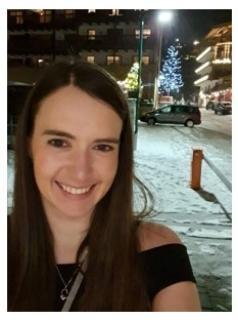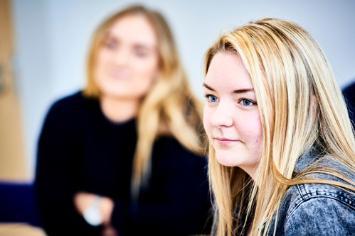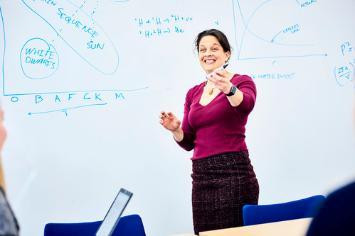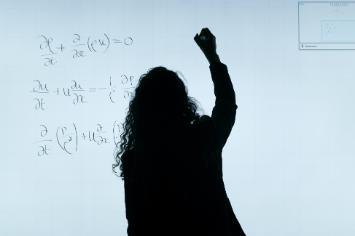Women from STEM Industry
Sarah Rogers
Mechanical Engineer, Babcock
You questions answered by Sarah in 2020.
"Where did you get your degree?" (Selby M)
Coventry University
"How did you decide to study mechanical engineering?" (Selby M)
I had always really enjoyed Physics and Design Technology, and Engineering was a combination of the two. There were several variations of Engineering such as Aerospace, Automotive etc. but I decided to do Mechanical as it is a broad subject and wouldn’t limit my future decisions on a career.
"What would you say would be an average day in Babcock?" (Evie P)
This is actually a very difficult question to answer as the graduate scheme is so varied it can change from day to day.
Over the past year my days have been completely different depending on what placement I was on.
One day I was specifying new compressors required for a project and the next day I was on AutoCAD designing the layout that the room would need to be to include all necessary equipment and pipe runs.
Another day I would be head to toe in PPE walking through flooded underground subways sketching the route for a new LP air system.
One day I could be calibrating radiation sensors using gamma rays (the radiation was locked away behind thick concrete walls of course!) and another day I would be taking them apart to replace any broken parts.
Every day starts the same however… A cup of tea and checking of emails!
Megan Reeve
Therapy Radiographer, NHS
You questions answered by Megan in 2020.
What are the most important qualities of a Radiographer? (Emma H)
I would say that the most important quality is to be able to care, you have to really want to be there every day and make a difference to people’s lives. You also need good empathy and listening skills for this job because we mainly deal with cancer patients and whilst the job is very positive because we are aiming to cure most of our patients, it is still a very scary journey for patients with lots of emotions involved.
This does need to be balanced with a range of other qualities though, I would say it is very important to be quick thinking, have good attention to detail, have good mental maths and a technical mind. We often have a lot of patients in a day, so it is good to be a fast worker and be able to problem solve under pressure.
What are the most challenging parts? (Emma H)
Running to time! Radiotherapy is an outpatient’s department and due to the number of patients we have and complexity of treatment we often run behind schedule, which can make the job challenging at times. However, I often enjoy having to think and work quickly but it can just be tiring on some days.
The other challenging aspect can sometimes be making decisions on your feet about how to give a patient’s treatment. Some days we just can’t get our patients in the right position and when we take an image it just doesn’t line up with what we want – these situations are challenging because you want to give a patient their treatment accurately and especially as we use such high doses of radiation. You just need good problem-solving skills and also team work because you always work in pairs so you never have to make these decisions alone.
Finally, working with cancer patients, whilst the majority of our job is extremely positive and on a day to day basis you wouldn’t necessarily even notice some of our patients even had cancer, there are of course some cases that really tug on your heartstrings. Sometimes it can be really challenging as you naturally become attached to certain patients that you have more of a rapport with and who might be very ill with their disease but that is why I do the job because the treatment we give will be helping them and also just being there for them can sometimes provide comfort in tough times.
What advice would you give to someone who wanted to go into a career in medicine or medicinal science? (Molly BT)
Be prepared to work hard! Studying for anything medicine or healthcare at university is tough; you will be expected to manage both a heavy academic workload and also clinical placements which will also have academic components attached. You need to be organised, have good time management skills and be dedicated to the profession. This is something that will carry on even when you are qualified as you are expected to carry out continuous professional development and take on research as you progress through your career. If it’s what you want to do it’s well worth it though, I personally find my job very personally rewarding and love what I do.
Also, I would say visit departments! Whatever you are interested in, see if you can arrange a visit even if it’s just for an afternoon to get a taster of what the job is like and then visit somewhere else to contrast and compare. It’s a big commitment so definitely try and pick something that suits your personality – there is so many careers to choose from across medicine and healthcare so find something you will enjoy! Have a good chat with people who work in the departments – ask them what they enjoy, what they don’t and get a feel for the day to day.
Valerija Peles
Area Coordinator, Advanced Mathematics Support Programme (AMSP)
Jessie Partlow
Site Workplace Services Lead, Procter & Gamble
Laura Thornley
Statistician, Northern Gas Networks
 "Don't worry about asking lots of questions. It's better to ask 100 questions and understand what you're trying to achieve first time, than not ask any and have to do it 100 times."
"Don't worry about asking lots of questions. It's better to ask 100 questions and understand what you're trying to achieve first time, than not ask any and have to do it 100 times."
What do I do?
I look at lots of different maths problems in my job. This can be trying to answer questions like ‘How many engineers do we need in and emergency?’, ‘Should we replace a metal pipe with a plastic pipe and should we do than now or in a few years?’ and ‘Are there any trends in our customer surveys/ complaints?’. Using maths helps us to answer these types of questions and provide proof that the answer can be trusted. This can help us to understand if we can save money, as well as make sure customers are kept safe using gas.
How did I get here?
After getting my degree I didn't know what I wanted to do for a career. I decided to take some time working abroad, learning new skills like sales and customer service to help me become a more rounded person. After 2 years working abroad, I started working for an online advertising company. We were responsible for the picture adverts on a website, making sure that the company the advert was for was earning money. This was a very modern company with lots of young people and perks, such as break rooms with xbox's and pool tables and we would be taken out to lunch regularly by other companies. Although I had to use some maths working here, it wasn't challenging enough and I got bored quickly. I then moved onto working for Northern Gas Networks as a Statistician. When I started I had no experience beyond my degree, so had to spend a lot of time re-learning how to do different tasks. My work allows me to keep learning new areas of maths and also learn about how a business works by getting involved in lots of different projects. There was no defining moment when I decided I wanted to be a statistician, I just kept doing what interested me. I have learnt that you spend a long time at work, so you have to enjoy your job. If you don't enjoy it then no matter how much money you earn, you still won't be happy!
The life I live
I used to work in France in ski resorts, running events like quizzes and sledging and cooking for 19 people. Skiing and snowboarding is an important hobby and I always make time to go away on holiday over winter. I like playing a sport called Korfball to keep fit, and taking my dogs, Ellie and Leo, out for walks in the park.
My Typical Day
A normal day is to go in to the office and work on my computer. My day can vary from being in meetings, researching new ideas, but is mostly doing maths in spreadsheets or using special computer programs to write code. I usually get to work on exciting projects with other teams, which involves planning how to do work, doing analysis, writing a report and presenting back the results. This was something I found quite difficult to begin with but there is lots of help and people to ask to help learn how to do these skills better. This year, my days have been very busy as we are working on a 5 year plan. This means there has been lots of coding needed, to make sure the maths behind the scenes is working properly. Then other teams can use our IT system to report out the 5 year plan. I have also been helping other people to learn how to use the system so that I can share work out between our team. In my job sometimes I get to travel for work. I have been to London & Midlands for meetings a few times this year, but I have also been able to travel to Ireland to present some of my work to different Statisticians.
My Qualifications
After school I went to sixth form college to study Maths, French and German at A-Level. I didn't know what I wanted to be when I was finishing college, so I chose to do subjects I was good at and enjoyed. I chose to do my degree in Mathematics and Statistics at University of Sheffield. I am continuing to learn more with the Royal Statistical Society, taking new courses and working to become a Chartered Statistician.
Paula McMahon
Regional Supervising Officer, Sir Robert McAlpine Ltd
Jill Branch
Secondary School Maths Teacher
Rachel Farrar
Group Tax Accountant, Home Group
Ranya Farzat
Senior Digital Marketing Associate, LoopUp
Jasmine Chin
Mechanichal Engineer, ARUP
Joanne Atherton
Chartered Accountant, Kellogg's
Guusje Ubachs
Structural Engineer, ARUP
Katy Spencer
Statistician, Sellafield Ltd
-184x320.jpg) Why did you choose to study Maths at University?
Why did you choose to study Maths at University?
I didn’t know what I wanted to do in the future at school. My school did some career questionnaires with me when I was in year 9. As I was interested in Maths, the results highlighted accountancy as a potential career. I never really thought too hard about careers in year 9.
During my A levels, I knew I wanted to go to University, but I didn’t exactly know what I wanted to do. I originally thought I wanted to go into healthcare and did some research into Occupational Therapy and Speech Therapy specifically. I decided that even though I loved the idea of these jobs, I really wanted to learn more maths at University.
What do I do now and how did you get to where you are now?
At University I didn’t know what I wanted to do. People said that accountancy was an option, so I investigated the types of work they do and applied for a few jobs and decided that it wasn’t for me! I wanted to use my statistics.
My first job after University was a Knowledge Transfer Partnership (KTP) Associate working with Newcastle University and Sellafield Ltd looking at developing new process monitoring tool and predictive models. I saw the advert and thought this sounds interesting – I had never even really considered working in the nuclear industry. This project was a 3-year project – I got lots of experience in statistics, managing projects and training. I got to go and present at conferences abroad including Paris and Barcelona.
After that job, I decided I really enjoyed working at Sellafield Ltd, so I applied for another job there and got it. I have worked on different plants across the company developing tools to look and analyse data. I have also made models to predict what could happen if you changed certain conditions.
My typical day
My days are filled with meetings, learning new statistical methods, looking at data and building tools for others to look at data both using spreadsheets and using different software. I write technical reports explaining sometimes difficult statistics to others who have not used these methods.
I spend most of my time working on the computer, but I could also be putting my safety shoes and hard hat on and going on plant. I never thought I’d be doing that at school!
I also manage other team members in our group, and we work together to get tasks completed.
Qualifications
I never really thought about what I wanted to do before choosing my A levels. I decided to continue learning about subjects that I enjoyed and seemed to be good at. I chose to do Maths, Physics, Geography and Psychology in my first year. I dropped Psychology as I didn’t enjoy it as much as the others. I chose to do an additional AS level in Russian as I enjoyed it at GCSE. Really random, but I really enjoyed it!
I have a BSc (Hons) Mathematics and Statistics degree and a MPhil from Newcastle University. I am a chartered member of the Institute of Mathematics and its Applications. I also was able to get some project management and leadership qualifications alongside these.
Rachel Beattie
Director and co-founder, Careaux
Lynsey McNeilly
Civil Engineer, Farrans Construction
This video has no audio.
blank



5-355x236.jpg)


